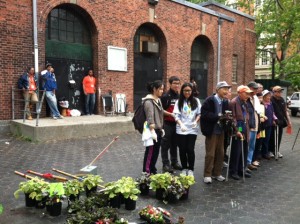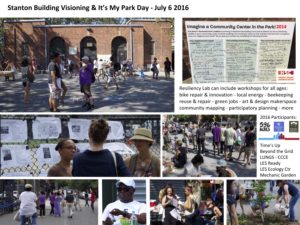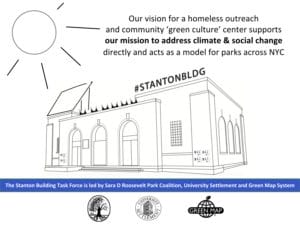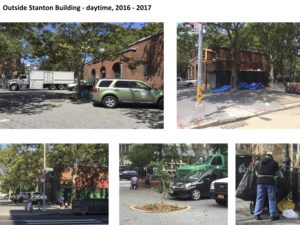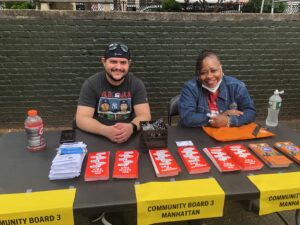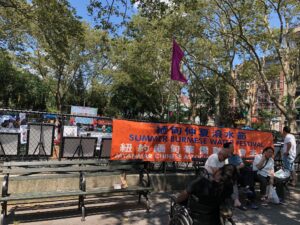New York City has a Capital Budget, separate from its annual operating (or expense) budget, which presents the funding plans for city construction and repair projects, and purchases of land, buildings, or equipment.
A “capital project” involves the construction, reconstruction, acquisition, or installation of a physical public improvement with a value of $35,000 or more and a “useful life” of at least five years. This may include everything from buying garbage trucks to reconstructing bridges to building housing.
The City Charter gives Community Boards a broad range of responsibilities for advising the City about local budget needs and priorities. The Charter mandates that the Community Boards consult with agencies on the district’s capital and expense budget needs, hold public hearings, prepare capital and expense budget priority lists annually, and react to the funding choices presented in the preliminary budget. To meet the Charter mandates a dynamic formal structure was created to enable the City’s communities to make their needs known to agency decision makers, the City Council, and the Mayor. The Office of Community Board Relations within the Office of Management and Budget (OMB) oversees procedures that assure the Community Board’s active and effective participation in forming the City’s budgets. The following outlines the essential features of this process.
The City’s Three Budgets
New York City’s budget year begins on July 1st and ends on June 30th. Its budget consists of three components:
- The Revenue Budget, which is the City’s best estimate of how much money will be available during the fiscal year to support operating expenditures and capital improvement projects. These include all tax, non-tax, and grant funds expected to be received during the fiscal year.
- The Expense Budget covers all the City’s day to day operations such as salaries and supplies as well as debt service. It is supported by City taxes, fees, and other local revenue as well as state and federal aid.
- The Capital Budget includes the cost of the City’s long term construction program and the purchase of land and large equipment. Reconstruction of streets, sewers, parks, and buildings are examples of capital projects. Capital budget items are financed by the sale of municipal bonds as well as by state and federal grants.
Additionally, the Community Development Program allocates federal money for long term physical improvements and related activities that chiefly benefit low and moderate income persons.
Overview of the Community Board Budget Process
As representatives of local communities, Community Boards are most concerned with City spending that affects the quality of life for residents and workers in their districts. The process by which the Community Boards participate in formulating the City’s budgets has six major elements.
- Consultations between Community Boards and Local Service Delivery Agencies
From May through September, Community Boards have two formal opportunities to consult with agency officials about budget needs and the funding of programs and projects.
The agencies that formally consult with the Boards are the Department for the Aging, the Department of Buildings, Economic Development/Business Services, Environmental Protection, Fire, Housing Preservation and Development, Parks and Recreation, Police, Sanitation, Transportation, and the Human Resources. Budget consultations take place at two levels:
- District Consultations – In late spring, District Managers and committee members meet with agency local representatives to discuss the needs of the district, the current level of service delivery, and the resources needed to meet those needs.
- Borough Consultations – During the month of September, Boards meet with agency commissioners to discuss long range needs, important budget requests, operational issues, agency policy choices, and fiscal constraints. At the Borough consultations Community Boards present their needs and budget suggestions and agency decision makers explain the difficult spending choices they must make.
These formal meetings give both the agencies and the Boards an opportunity to openly discuss the criteria used in making spending choices.
- September/October Public Hearings by the Community Board
Each September and October Community Boards hold committee meetings and a public budget hearing to help develop specific budget priorities. During the hearing the public and Board members have the opportunity to identify community district needs. At Queens Community Board 3, this hearing takes place during a Public Participation Session at the Board’s September monthly meeting. Additional opportunities for public participation in the budget process comes at meetings of its Capital & Expense Budget Committee during September and October.
- Formal Budget Submissions
By the date announced by OMB, usually late October, Boards must formally submit their budget requests to City agencies and the Office of Management and Budget as the agencies begin to prepare their next year’s budget. Budget submissions consist of three components:
- Requests for funding in the Capital Budget for physical improvements to the City’s infrastructure and public facilities, for land acquisition and major equipment.
- Requests for funding in the Expense Budget for programs, supplies, and personnel.
- Community Board Service Program Rankings wherein Boards indicate the importance of service to their community by ranking as many as 80 programs provided by 23 agencies.
- Review of Agency Responses to Board Budget Requests
After Community Boards submit their requests in October, City agencies review them and make funding recommendations in the City’s Preliminary Budget and Departmental Estimates, published about January 16th. Agency responses to Community Board budget request are published by OMB in the Register of Community Board Budget Requests for the Preliminary Budget each January. The Boards then have an opportunity to respond to the agency decisions in their Statement on the Preliminary Budget, due in February.
- OMB Review of Board Budget Requests
For the Mayor’s Executive Budget, published on April 26th, these same budget requests are evaluated by OMB with funding recommendations published in the Register of Community Board Budget Requests for the Executive Budget.
- Public Hearings at which the Boards Testify
Community Boards may testify in February at Borough Board hearings prior to submitting the Borough Board Budget Priorities and Borough President submissions to the Executive Budget. Again in March and May Boards may testify at City Council hearings on the Preliminary and Executive Budgets.
The Community Board’s participation in the budget process is a year round activity. Even before one budget is adopted, a new process of considering budget requests for the next cycle begins.
Assessing Community District Needs
Assessing community needs is one of the most important and useful activities performed by Community Boards in determining the district’s service and budget requests. This is an ongoing activity that involves each Board member and committee. Personal observations, published surveys, public hearings, discussions with local service chiefs, and the use of such community records as minutes from the District Service Cabinet and the district office complaint log can all help in identifying patterns or areas of problems within the community.
The Board determines if an identified problem can be addressed by reallocating existing resources or through a request for capital or expense budget funds. Throughout this process, an understanding of overall City and agency funding priorities and constraints helps the Board match its budget proposals to available funds.
The Board’s long range needs are presented to City decision makers in the Statement of Community District Needs which is published by the Department of City Planning within a framework of information detailing demographics and community facilities.
Geographic Information for Community Boards
The more a Board knows, the more effectively it can participate in developing the City’s budgets. To this end, OMB publishes expense budget and service information sorted two ways: by agency and by local service district. The first gives the Citywide picture for the agency and the second shows community and borough allocations of money, personnel and equipment. Boards can find out how many people are assigned to their district, what they do, how much they are paid, the equipment assigned to the district and contract services for agencies which provide local level services. Indicators of agency performance are also published in the District Resource Statement and the Geographic Reports for the Expense Budget.
OMB also publishes capital information on a geographic basis so that Community Boards know which projects are being funded in their districts, how much they will cost, and when implementation is planned for each project phase. Geographic Reports for the Capital Budget are published with the release of each budget phase.
The Capital Commitment Plan details projects planned for the next four years. The planned timing and the cost of each phase of a project is available to the Community Boards. Combining formal budget participation mechanisms with increased availability of geographic information gives the Community Boards the opportunity to influence agency and OMB budget decisions about the allocation of city resources.
Budget Process Timetable for Community Boards
New York City’s fiscal or budget year runs from July 1 of one calendar year through June 30 of the next. The following describes the steps in the budget adoption process. The deadlines shown are mandated by the City Charter but are subject to slight annual changes by the City Council and Mayor.
- June/July – The budget process begins with District Consultations between agency district service chiefs (Police Precinct Commanders, Sanitation Superintendents, Parks Supervisors, etc.) and Community Boards (CBs) to discuss local needs.
- June – CBs assess district needs and prepare District Needs Statements (a narrative description of their communities and their needs). CBs’ District Needs Statements are submitted to the Department of City Planning.
- By August 15 – Eleven major agencies submit a policy statement describing major goals and priority programs for the coming year to the Office of Management and Budget’s Office of Community Board Relations.
- September/October – CBs hold public hearings on district needs and budget priorities. In each borough, consultations are held between CBs and top managers of eleven major agencies.
- By Late October – CBs submit their budget requests to OMB.
- By Early November – OMB sends CBs’ budget requests to agencies for evaluation in preparing departmental estimates of agency budget requests for the coming year.
- By January 16 – Every two years the Mayor submits a draft of the Ten Year Capital Strategy outlining how the capital budget will be used. The City Planning Commission holds a public hearing on the draft Year Capital Strategy in odd numbered years.
- By January 16 – Release of the Mayor’s Financial Plan and Preliminary Budget, which includes the departmental estimates. OMB sends the CBs the Register of CB Budget Requests, a list of Board requests with agency funding recommendations.
- By January 30 – The Mayor released the Preliminary Mayor’s Management Report detailing agency performance during the first four months of the budget year.
- By February 15 – CBs hold public hearings on the Preliminary Budget and send a Statement on the Preliminary Budget reflecting CB reaction and public testimony to the Mayor, City Council, Borough President and Borough Board.
- By February 25 – Borough Boards hold public hearings as input for their comments on the Preliminary Budget and for the Borough Presidents’ recommended modifications to Preliminary Budget.
- By First Week in March – OMB holds public hearing on the Community Development Program, dealing with Federal funds that are given to the City.
- By March 10 – Borough Presidents submit capital and expense budget allocations and modifications to Mayor for inclusion in Executive Budget.
- By March 25 – City Council holds public hearings on Preliminary Budget.
- By April 26 – Release of the Mayor’s Executive Budget. OMB sends the CBs the Register of CB Budget Requests with OMB funding recommendations, and the proposed Community Development Statements of Objectives and Budget.
- By May 6 – Borough Presidents modify Executive Budget submissions when necessary.
- By May 25 – City Council holds public hearings on Executive Budget.
- By June 5 – City Council adopts budget.
- By June 21 – Mayor, Comptroller, and City Clerk certify budget.
- July 1 – New Budget Year Begins.
- After July 1 – OMB sends the CBs the Register of CB Budget Requests with the final disposition of requests.
By one month after Budget Adoption, Borough agency service chiefs submit plans for allocation of personnel and resources to the Borough President. Within 30 days of receiving such plans, the Borough President may propose a reallocation of staff and resources, providing the modification does not increase or decrease personnel or resources for any Community District by more than 5 percent.

